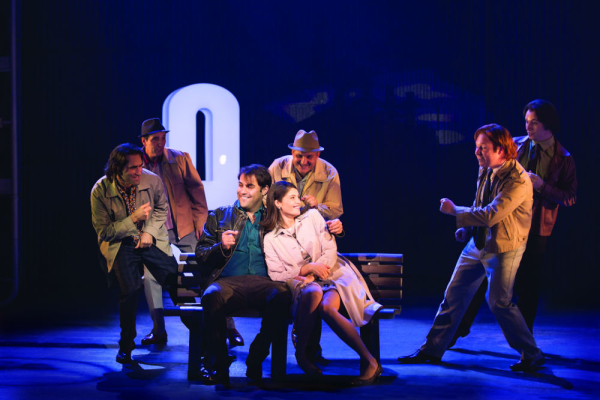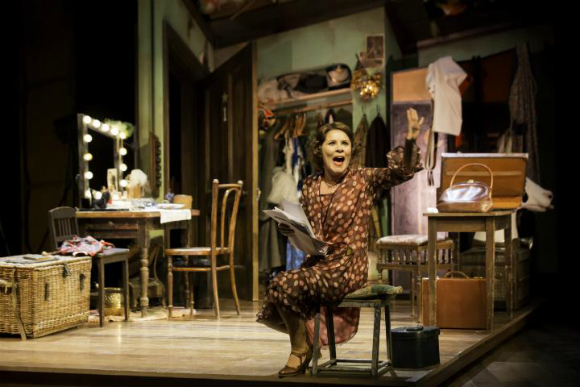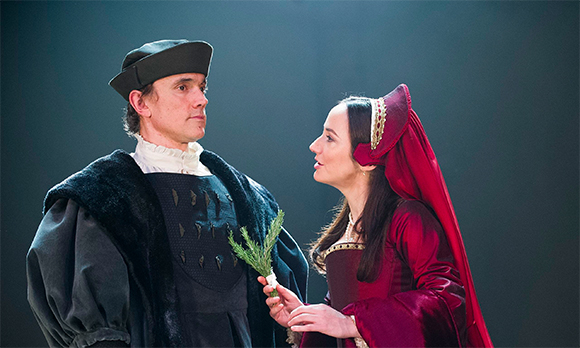Looking back: Michael Coveney's theatre review of 2014
Our chief critic reflects on his theatrical highs and lows of the past 12 months

© Manuel Harlan
In the year of the Great War centenary, we had pertinent new plays – Peter Gill's lyrical, gorgeously acted Versailles at the Donmar, Nicholas Wright's Regeneration at the Royal and Derngate , Northampton, Deborah Andrews' An August Bank Holiday Lark for Northern Broadsides on tour – as well as a feisty revival of Joan Littlewood's (it was her centenary, too) Oh What a Lovely War.
There were big historical trilogies (by Rona Munro, enlivening the debate over Scottish independence; and David Edgar, his post-Berlin Wall plays re-visited at the Cockpit by a visiting American company) and blockbusters, new theatres and an £80 million re-build at the National Theatre, three humdingers from the Young Vic, three full-scale double-headers from the RSC, and a most unexpected, top-class pair of performances from Gemma Arterton – as the title character in The Duchess of Malfi, which opened the candlelit Sam Wanamaker in January, and as the Ford's car factory shop floor leader in the ebullient musical version of Made in Dagenham in November.
This double, for its range, beauty and surprise element, made Arterton, for me, the actress of the year, though she was hard pressed by Gillian Anderson as Blanche DuBois in A Streetcar Named Desire at the Young Vic, Juliet Stevenson as the entombed Winnie in Happy Days also at the Young Vic, Helen McCrory as Medea at the National, Lesley Sharp as the woozy vulgarian mother in A Taste of Honey, also at the NT, and Kristin Scott Thomas finding a new tragic level as Electra at the Old Vic.
Made in Dagenham was also a really fine, fresh new British "working class" musical, directed by Rupert Goold, in the perhaps over-familiar vein of Billy Elliot and The Full Monty. I also really enjoyed I Can't Sing! (in which Cynthia Erivo raised the roof) at the London Palladium, a light entertainment vaudeville using X Factor television hysteria as an ironic framework, which pleased critics but not the X Factor fans, who stayed away in droves. The Palladium, which has looked dodgy all year, recovered with the brilliant revival of Cats and its fantastic dance routines.
This was a relief as the other blockbuster revivals – of Miss Saigon and Evita – were disappointing, the first exposing the weakness of the original material (what a falling off was there from the authors of Les Misérables) and the second simply, as a production, provincial and second-rate, despite Madalena Alberto's spirited Eva Peron lookalike. Urinetown I can never learn to love, and Jamie Lloyd's production was as charmless as his otherwise perfectly adequate, though under-cast, revival of Sondheim's Assassins at the Menier Chocolate Factory.
Apart from Cats, my best musical theatre nights were, unequivocally, Dirty Rotten Scoundrels at the Savoy, starring Robert Lindsay, Rufus Hound and Katherine Kingsley; the exquisite pocket-stage revival by Michael Strassen of Sondheim's Pacific Overtures at the Union; and the Latino cousin of West Side Story and Rent, In The Heights, a 2008 Broadway firecracker at the Southwark Playhouse. I look forward to catching Imelda Staunton's "Rose's turn" in Gypsy when it comes in from the Chichester Festival Theatre, which re-opened after a beautiful and clever £22 miliion refurb, on time and buzzing.

© Johan Persson
The National rocked with Here Lies Love, a sexy rave musical about Imelda Marcos, imported from New York, by David Byrne and Fatboy Slim, which re-opened the re-fitted Cottesloe as the Dorfman (Lloyd Dorfman's the guy who gave £10 million to the rebuild and created the fantastic Travelex £10 (now £15) ticket scheme; give him a corridor, or a room, sure, but a theatre once graced by such possibly appropriate rival nominees as Richardson, Scofield and Robert Stephens, not to mention the Bill Bryden company?). The end of the year kicked in with the arrival from the National Theatre of Scotland (via the Edinburgh Festival) of Rona Munro's The James Plays, David Hare's scrupulous adaptation of Katherine Boo's The Beautiful Forevers and Tena Stivicic's Croatian political and family saga, 3 Winters, a late candidate for best play of the year.
It is strange how the memory of Simon Russell Beale's NT King Lear, directed by Sam Mendes, has faded, though it had some marvellous qualities of both clarity and self-delusion; SRB was trumped by Rupert Everett as Salieri in Amadeus at Chichester, Mark Strong in Ivo van Hove's stark grey minimalist revival of Arthur Miller's A View from the Bridge at the Young Vic, and Tim Pigott-Smith leading a fine cast in Mike Bartlett's King Charles III.
The latter was certainly one of the plays of the year, originating at Rupert Goold's irresistible Almeida Theatre, which produced the most distinctively ambitious and original play I saw, Anne Washburn's Mr Burns, directed by Robert Icke; another American dramatist, Jennifer Haley, supplied the Royal Court with a "talking point" drama, The Nether, covering paedophiliac urges in cyberspace. And Richard Bean's Great Britain (starring Billie Piper at the National, and Lucy Punch on its transfer to the Haymarket), was a hot-off-the-presses response to the phone hacking trials at the Old Bailey; Nicholas Hytner's production was announced on a Wednesday and opened the following Monday, an unprecedented time frame.
The jury's still out on Gregory Doran's new tenure at the RSC, but there were notable projects: the two parts of Henry IV starring Antony Sher as Falstaff in an otherwise straightforward-bordering-on-humdrum revival of these magnificent plays; a much-trumpeted but dogged Mike Poulton adaptation, directed by Jeremy Herrin, of Hilary Mantel's Thomas Cromwell novels, Wolf Hall and Bring Up the Bodies (about to be superseded, I reckon, by the upcoming BBC TV version starring Mark Rylance and Damian Lewis); and, best of all, Christopher Luscombe's "post-Downton Abbey" revivals of Love's Labour's Lost and Much Ado About Nothing (also known as "Love's Labour's Won"), set either side of the Great War and starring two of our most brilliant new actors, Edward Bennett (David Tennant's Hamlet understudy) and Michelle Terry; both were truly wonderful as, respectively, Berowne and Benedick, Rosaline and Beatrice.

© Tristram Kenton
The trouble with the RSC is that so much of their best work never sees the light in London. The public is entitled to see their worst work there, too; no news, so far, of any transfers for the Luscombe double, or the controversial Swan Theatre season of Jacobethan plays including Eileen Atkins, luminous and ferocious, as The Witch of Edmonton. The Henrys came to the Barbican, but there seems no urgency about re-establishing the Peter Hall principle of a joint Stratford and London operation so casually and irresponsibly cast away by Adrian Noble.
Shakespeare in London is now the prerogative of the Globe, who had another great year – Dominic Dromgoole's last in charge – with a terrific Julius Caesar, Eve Best's skittish and impetuous Cleopatra, and a revival of Lucy Bailey's blood-curdling Titus Andronicus, magnificently led by William Houston, one of our too few genuinely heroic Shakespeareans.
Bailey, with Rachel Kavanaugh – and Jonathan Munby – must be among the front-runners to succeed Dromgoole as Rufus Norris – who did a great job on The Beautiful Forevers – slides into Hytner's seat along the towpath at the NT. The Globe was unavoidably evoked in Declan Donellan's enjoyable, soft-centred Shakespeare in Love (not a patch on the film), a West End highlight alongside Angela Lansbury in Blithe Spirit, Beverley Knight in Memphis and Bill Nighy and Carey Mulligan, both superb, one all tics and tiddly-winks, the other serene and forbearing, in Stephen Daldry's perfect pitch revival of David Hare's Skylight.
Two cheers, too, for Yaël Farber's atmospheric in-the-round revival of The Crucible at the Old Vic, Sean Holmes's continuing "Secret Theatre" season at the Lyric, Hammersmith (and a nod to that dedicated and talented acting ensemble), and the international Ibsen season at the Barbican (Thomas Ostermeier's electrifying take on An Enemy of the People was easily the pick).
But I reserve my "show of the year" accolade as a dead heat between the Donmar's exquisite revival of Kevin Elyot's My Night with Reg (such a relief that the play was as good as I hoped it still would be) and the Kinks back catalogue musical, Sunny Afternoon, directed by Edward Hall at Hampstead Theatre (transferring to the Harold Pinter), featuring the best pop songs on the London stage and a deceptively skilful book by Joe Penhall that evoked an era with more joy than sentimentality and told a great "music industry" story without any gratuitous levering-in of the musical items; an upmarket Mamma Mia! in fact.
Vote on the best of the past year in theatre at awards.whatsonstage.com












